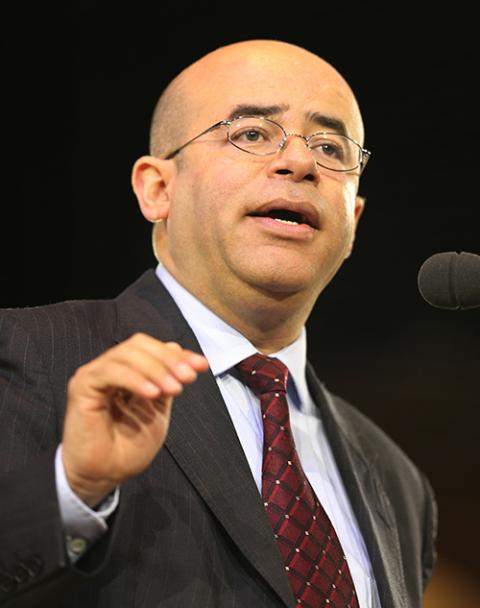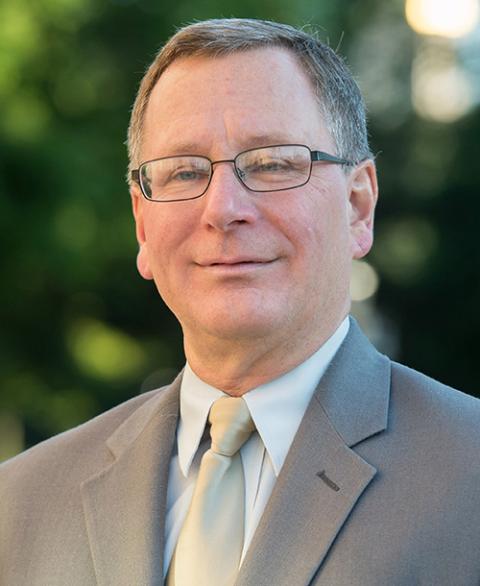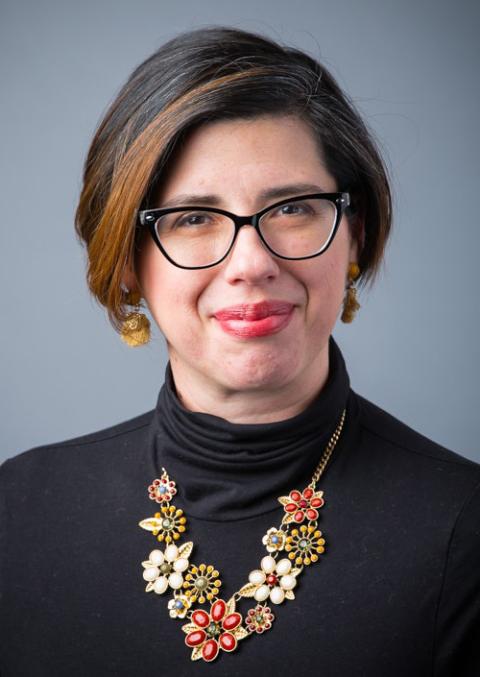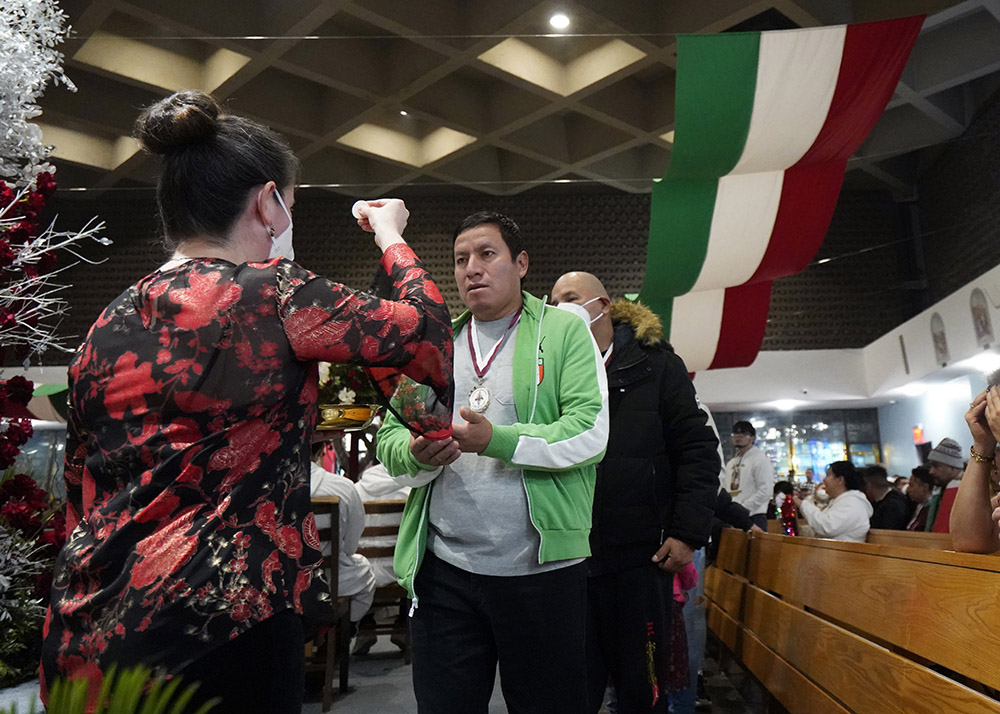
Worshippers receive Communion during a Spanish-language Mass celebrated on the eve of the feast of Our Lady of Guadalupe at Our Lady of Mount Carmel Church in Staten Island, New York, Dec. 11. Our Lady of Mount Carmel-St. Benedicta-St. Mary of the Assumption Parish ministers to a large population of immigrants from Mexico. (CNS/Gregory A. Shemitz)
As the U.S. bishops undertake a three-year initiative to revive American Catholics' interest in attending Mass each week, some church leaders are renewing their focus on a particular issue: the tendency of many Latino Catholics to refrain from receiving Communion.
Bishop Andrew Cozzens of Crookston, Minnesota, the lead organizer of the National Eucharistic Revival, said recently that "one of the constant desires of the heart" in his own ministry with Latino Catholics has revolved around the question: "How do we invite them to a deeply eucharistic life?"
In a press conference during the bishops' annual meeting in Baltimore in November, Cozzens framed that issue as a "great challenge" facing Catholic leaders. A 2015 Pew survey found that, in the U.S., only 21% of Hispanic Catholics receive Communion at every Mass they attend, compared to 56% of those who are white.
In interviews with NCR, theologians and experts in Latino ministry pointed to a variety of reasons members of the community often attend Mass but do not take Communion, and offered a number of suggestions for how the ongoing revival might encourage full participation in the liturgical celebration.
They also stressed that the mindset about the Eucharist in immigrant and Latino communities is often different than that in primarily non-Hispanic parishes.
Hosffman Ospino, an associate professor of Hispanic ministry and religious education at Boston College, said that Latino immigrants approach Communion differently than their descendants. "Half of an entire congregation may as well not receive Communion" in Latin America, said Ospino, who was born in Colombia.
Timothy Matovina, a professor of theology at the University of Notre Dame who focuses on Latino Catholics, said that many Latinos "almost act sometimes as if the Eucharist is reserved for the most holy. You'll hear people say, 'Well, my parents were divorced, so I can't receive Communion,' which of course is not true."
The Eucharistic Revival, which was launched in June, includes a number of diocesan- and parish-level events to promote appreciation of and participation in Communion, and will culminate in July 2024 with a National Eucharistic Congress in Indianapolis.
During the Baltimore press conference, Bishop Daniel Flores of Brownsville, Texas, a member of the bishops' advisory group for the revival, also spoke about the lower rate at which Hispanic Catholics receive Communion. Asked by NCR about the issue, Flores said he would not characterize the gap as a problem.
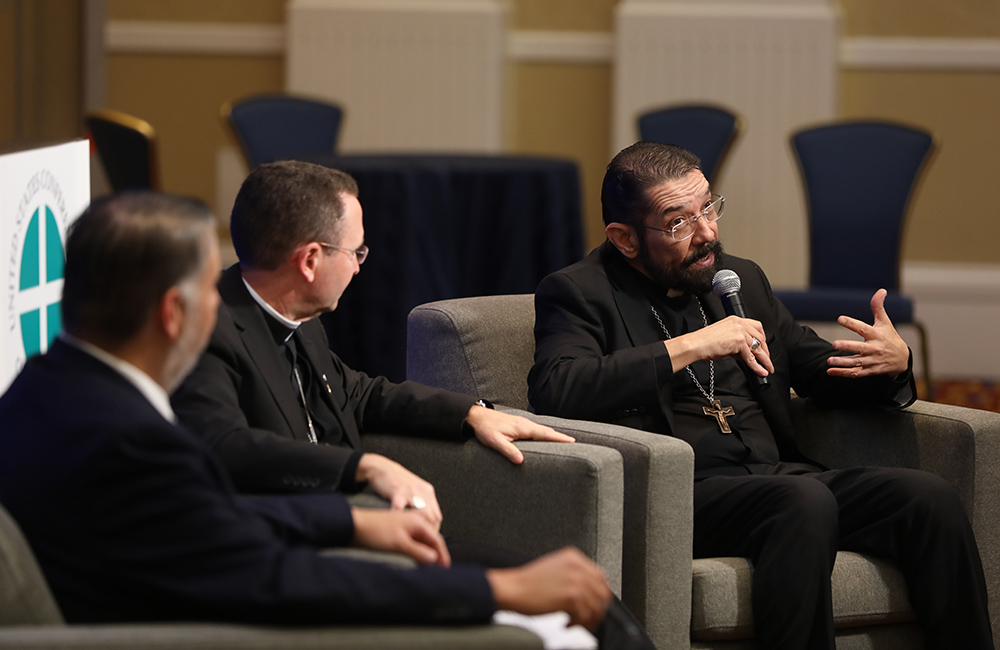
Bishop Daniel Flores of Brownsville, Texas, speaks during a news conference on the National Eucharistic Congress prior to a Nov. 16 session of the fall general assembly of the U.S. Conference of Catholic Bishops in Baltimore. Also pictured is Cande de Leon, chief advancement officer of the congress, and Bishop Andrew Cozzens of Crookston, Minnesota. (CNS/Bob Roller)
"It's better just to recognize that there often is a difference in how different traditions of the faith and expressions of that faith in the Eucharist show themselves," said Flores, pointing out that there is great diversity among Hispanic communities.
Flores said that instead the church should "observe" and "respect" Hispanic attitudes toward the Eucharist, and spoke particularly about the beauty of the Hispanic practice of eucharistic processions.
Said Ospino: "Latino Catholics in general have a profound love and respect for the Eucharist."
Marilyn Santos, associate director of the U.S. bishops' Secretariat of Evangelization and Catechesis, told NCR in a phone interview that the Eucharistic Revival has invested in multiple methods of outreach and inclusion for Hispanic Catholics. As an example, Santos said the Spanish-language version of the revival website is not a direct translation of the English version, but created specifically for Hispanic Catholics.
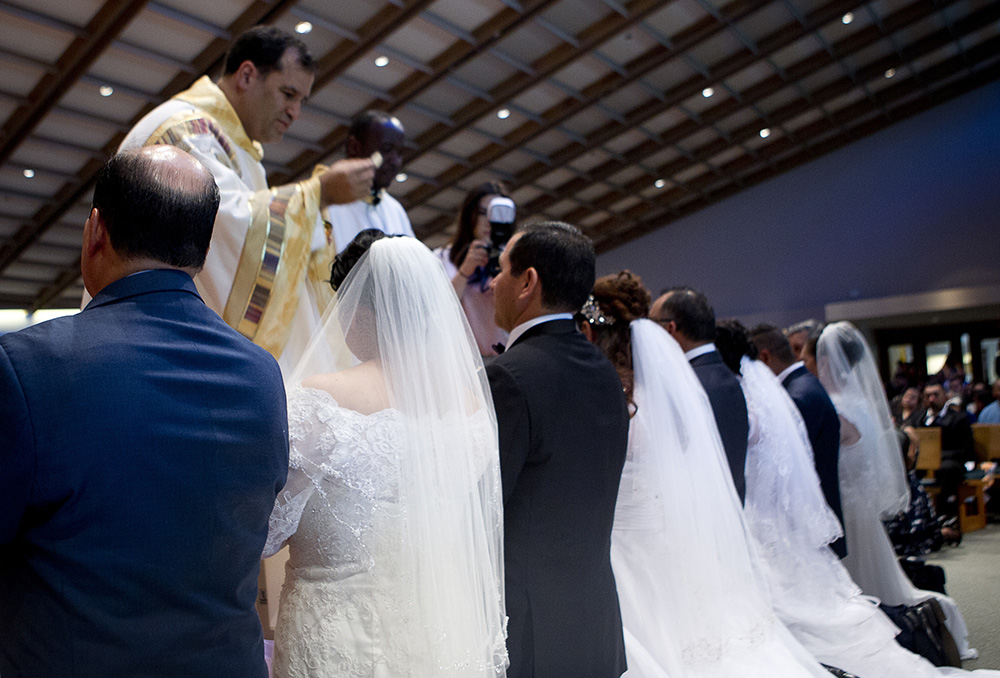
Maria and Arturo Perez receive Communion for the first time as a couple during their convalidation ceremony at Good Shepherd Catholic Church in Alexandria, Virginia, June 24, 2017. They joined other couples blessing their civil union. (CNS/Tyler Orsburn)
One major reason that theologians cited as a possibility for why Latino Catholics might refrain from taking Communion is that they may be living in romantic relationships that do not strictly align with the church's official teachings. For example, some may be living with a partner before marriage or may have been married civilly, but not in the church.
Ospino said he did not have specific statistics on that issue, but estimated that the majority of Latino Catholics under 40 in the U.S. have not been married in the church.
Generally, he said, the rate of sacramental marriage in the U.S. has dropped "dramatically." According to data from Georgetown's Center for Applied Research in the Apostolate, only 29% of all U.S. Catholics getting married in 2016 did so in the church.
Matovina said reasons Latinos do not get sacramentally married can vary. He said some immigrant couples may wish to wait for a church wedding until they can be reunited with extended family members, or may struggle to pay for the costs of a wedding.
Natalia Imperatori-Lee, a professor of religious studies at Manhattan College, echoed Matovina's concerns about cost. "In my home diocese of Miami, it costs hundreds of dollars to do a church wedding," she said.
Santos said revival organizers hope to spread the message that Catholic sacramental marriages are available especially to undocumented people, and to encourage parishes to adjust faith formation programs to accommodate the busy schedules of recent immigrants.
Inspired by the Eucharistic Revival, Franciscan Fr. Brian Jordan, pastor of St. Camillus Parish in Silver Spring, Maryland, decided to hold a communal wedding Mass on Dec. 11 at the 12:30 Spanish-language service.
"It's a joy to have the celebration of the sacrament of marriage, and the couples feel able to receive the body of Christ for the first time in years, in some cases, maybe the first time ever," said Jordan.
Marco Mejia, who with his wife, Patricia, helped lead marriage preparation for the December Mass, said the majority of the couples have been civilly married for years. Many have not had sacramental marriages for financial reasons.
"Not only for me, for every Catholic, it should be very important to go to Communion," said Mejia.
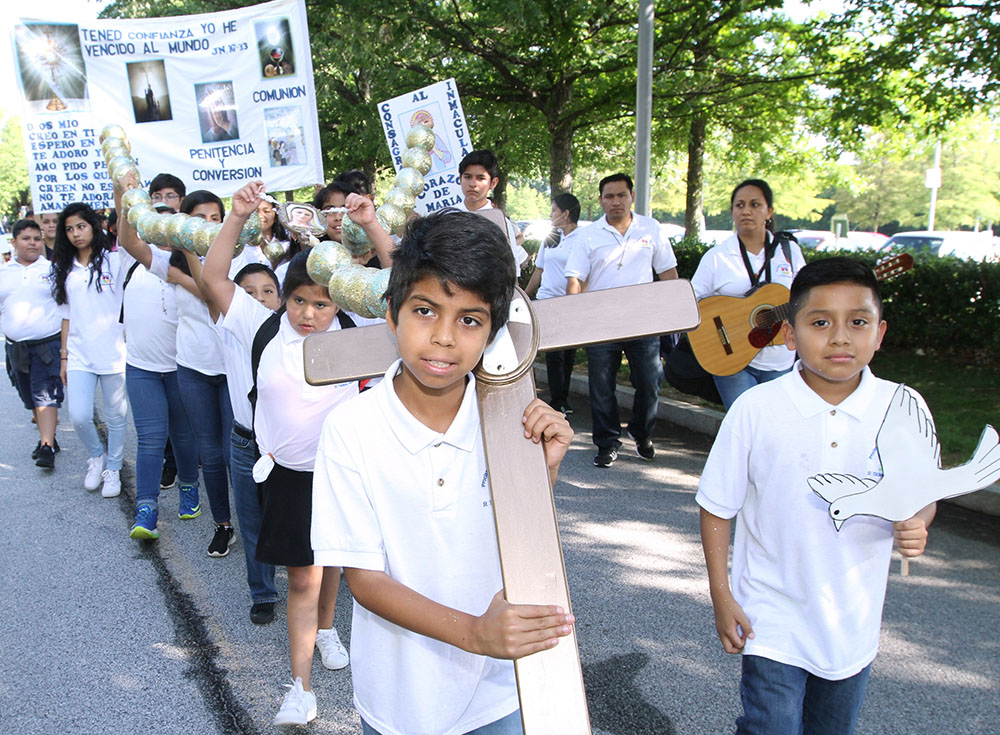
Jesus Solorio carries a cross during a Eucharistic Congress procession June 17, 2017, in College Park, Georgia, in the Atlanta Archdiocese. (CNS/Georgia Bulletin/Michael Alexander)
Some Catholics are able to have sacramental weddings after being married civilly, but for other Latinos, church teaching puts them in a difficult bind.
Eder Díaz Santillan, host of the podcast "De Pueblo, Católico y Gay," said the church's teaching against queer and same-sex relationships can exclude Latino Catholics from full participation in the church.
"The prohibitions on receiving Communion while cohabitating alienate LGBTQ+ Latinx individuals like myself," said Díaz via email. "As a baptized Catholic, l am part of the church, and I want to be included in all the blessings God gives us."
Díaz said that the consequences of excluding LGBTQ+ Catholics from sacramental marriage go beyond access to Communion. In talking with LGBTQ+ Latinx Catholics for the podcast, "I have found that most families who reject their children, do so by citing the church's alienation of the LGBTQ+ community as an example," Díaz wrote.
Advertisement
Oscar Castellanos, director for the Initiative for Parish Renewal (Renovación) at Marian University in Indianapolis, said another reason U.S. Latinos may not take Communion — beyond the issue of sacramental marriage — is because they are unfamiliar with American practices around the sacrament of reconciliation, and then see themselves as unable to celebrate Communion without first going to confession.
In Latin America, people feel free to approach a priest and ask, " 'Can you hear my confession?' And you might be walking, you might be in the park, you might be in the airport, just outside of Mass," said Castellanos, who was raised in both Mexico and the U.S.
But in the U.S., Castellanos said, "the system tells you, 'No, you go on Saturday, and you make an appointment.' "
As they evaluated the Eucharistic Revival, theologians and ministry leaders had differing perspectives on its engagement with the Latino community.
Imperatori-Lee expressed disappointment that the bishops were not placing greater emphasis on increasing accessibility to the sacraments, especially for Latino Catholics who might struggle to access sacraments financially or in their languages.
"This is a case where I don't think that the U.S. church is meeting people where they are. I think the U.S. church is trying to set the bar higher and see if people will come to it," she said.
This perspective contrasts with Pope Francis' 2016 apostolic exhortation Amoris Laetitia ("The Joy of Love"), said Imperatori-Lee. "[Francis] was saying that the Christian community tries within its circumstances to live as close to the rules as possible, but that the church too must meet people where they are," she said.
Other theologians and leaders agreed more with Flores' perspective of observation and respect.
"I would love to see more people receiving the Eucharist in the Latino community and in other communities," said Ospino, but "I'm also mindful that there is some wisdom among Latinos who choose not to receive the Eucharist."
Instead of creating a "master plan" from an office, Ospino invited theologians and church leaders to go and see how the Eucharist is celebrated in Latino communities.
For Imperatori-Lee though, the Eucharistic Revival left her with one question: "Why are you comfortable keeping people from the Eucharist if it is the summit and the source of the Christian life?"

